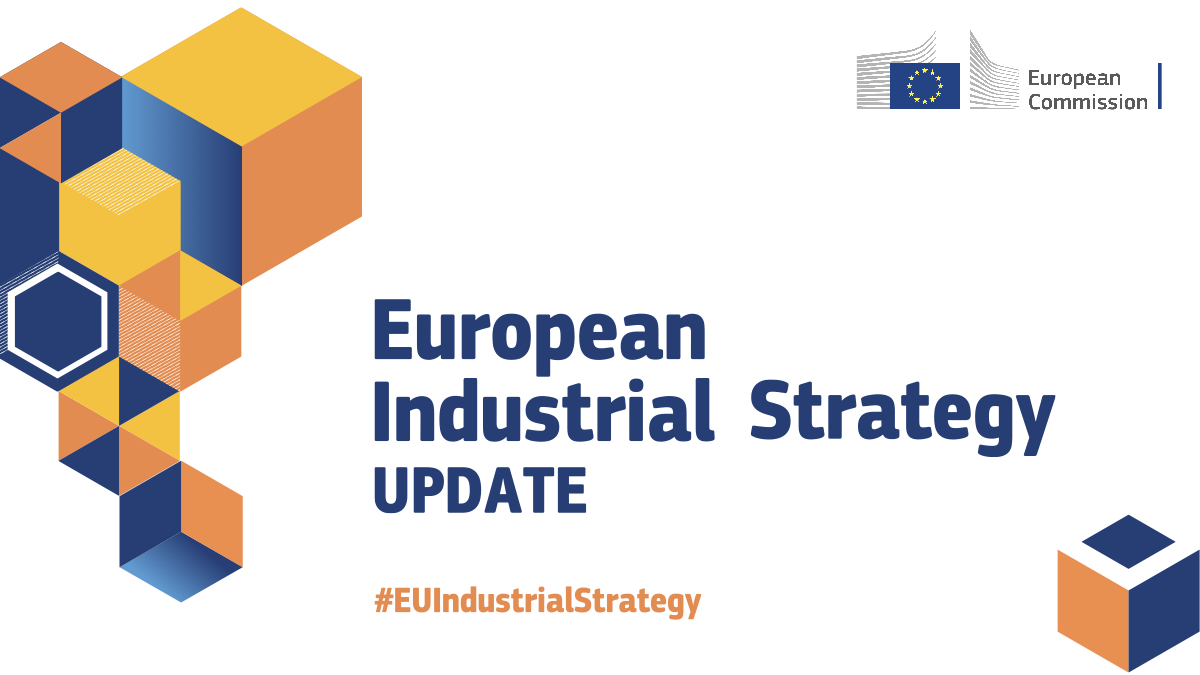
The European Commission’s Communication of the 5th of May addresses several requests from Member States, notably in relation to the assessment of the resilience of the Single Market, to the identification of strategic dependencies in key vulnerable ecosystems, such as health, and to the selection of Key Performance Indicators (KPIs) to monitor the implementation of the Strategy.
CECOP welcomes the update of the industrial strategy which complements (does not replace) the original industrial strategy published in March 2020. CECOP also salutes the ambitious scope that is foreseen in addressing key elements such as EU industrial and technological strategic dependencies, a more resilient and well-functioning Single Market and the need to support and accelerate the twin digital and green transitions of EU Industry, especially among SMEs.
Since the Industrial strategy update does not acknowledge the importance of worker and social cooperatives to create and maintain jobs, especially in difficult times, this reaction paper represents an occasion for our network to shed light on the lessons learnt from the COVID-19 crisis by European worker and social cooperatives active in industry and services.
Lessons drawn from the COVID-19 crisis
Considering the democratic nature of cooperative workplaces, workers in some cooperatives have shown their willingness to commonly decide on and accept reduced working hours and pay freezes to allow the cooperatives to get through this difficult time and to avoid laying off staff. Cooperatives’ responsibility towards their workers makes cooperatives prone to only consider lay-offs as a measure of last resort, thus helping to stabilize the workers’ income and purchasing power.
The worker cooperative business model has shown, for instance in Italy, higher resilience facing the pandemic and is demonstrating its anticyclical role in the aftermath of economic shocks. While until now a set of measures have been taken by the Government to avoid business bankruptcy and save businesses from closing (through the access to credit and support for liquidity, suspension of payment obligations and the ban on collective and individual dismissals), worker cooperative federations in Italy foresee that when the support measures will cease, an increasing number of companies will be bought out by their employees in the form of cooperative worker buyouts (business transfer to employees under the cooperative form). Initiatives such as worker buyouts are proving to be an effective instrument to accelerate the transformation and the diversification of SMEs operating in traditional sectors towards more sustainable business models, whilst safeguarding and regenerating jobs opportunities at local level. Hence, industrial policies creating a European common framework sustaining the creation and the financial support for cooperatives workers buyouts are much needed. In this matter, high expertise has been developed in different Member States (Italy, Spain, and France) over the past decades and important measures have been taken in Italy at national level during the pandemic to further support the development of WBOs. The European Union furthermore needs to ensure that state aid regulations allow for support to worker buy outs and business transfers to employees that avoid the loss of employment.
Local supply chain resilient to global shocks
Furthermore, the COVID pandemic showed the vulnerability of transnational supply chains and the importance to maintain and further develop some strategic capacities in Europe in order to decrease the level of dependence from abroad, particularly in some crucial sectors such as electronics and health.
By nature, locally rooted and fully integrated in the local communities, cooperatives showed their ability in maintaining a capable industrial basis in Europe, and many were able to quickly respond to new challenges and demands within Europe. Where large-scale supply chains collapsed due to border closings, export restrictions and other measures, cooperatives, based in their community, started to produce much-needed goods such as Personal Protective Equipment (masks and sanitizers) locally. The fact that different industrial cooperatives with a global outreach during COVID pandemic have reshored (transferred back) different manufacturing activities and have further promoted the creation of local and national value chains bears witness of the importance of the local dimension of economic development.
At the same time, border closings have strongly accelerated servitization (shift from production of goods to provision of services) processes of industrial cooperatives that was enabled by a more intense use of digital technologies. This development anticipates a shift that is here to stay and that calls on a different organisation of work and support to up-skilling and re-skilling processes.
Active engagement of worker and social cooperatives in decision-making and public-private partnerships
Lawmakers and administrations need to be aware of the capabilities of cooperatives in industry and services. Especially considering the urgency with which the recovery funds are addressed and allocated, it is important that cooperatives and their federations remain integrated as key partners in the making of both national industrial strategy and recovery mechanisms. Partnerships and ecosystems that are foreseen in the industrial strategy allow to build this visibility.
Public-private partnerships must facilitate a strong Social Economy
Furthermore, the crisis showed the return of the State as an investor and guarantor of stability. Public-private partnerships can help cooperatives to thrive and provide important services of general interest in their communities, whilst providing quality jobs and making ‘social Europe’ a reality. To this end, the ability of social economy enterprises to include a variety of actors in the design of social and general interest services, enhancing their skills and resources, will be crucial.
Public-private partnership can be ever more crucial in sectors where cooperative solutions are already implemented as a successful, democratic business model that provides quality jobs and services; this is the case, for example, for platform cooperatives active in the digital economy and energy sectors.
Regional innovation ecosystems to build adaptable and diverse ecosystems
The European Commission proposed an organisation of the March 2020 industrial strategy into 14 industrial ecosystems including the “Social economy and Proximity” one. However, while social economy and proximity is presented as a standalone ecosystem and we welcome the attention given to the social economy that deserves indeed a specific approach, CECOP reiterates the diversified nature of social economy enterprises and cooperatives, which are indeed active on a wide range of economic sectors, from general interest service, of course, to manufacturing, services, hospitality and tourism, construction, etc.
The development of regional innovation ecosystems, based on the design and deployment of EU Smart Specialisation Strategies, may contribute to the entrepreneurial discovery process and to the construction of effective ecosystems able to cooperate and deliver on the digital and green agenda both at regional and European level.
Strategic capacities to successfully master the green and digital transition: challenges and opportunities
Worker and social cooperatives across Europe have committed to deliver a just and green transition. In order to remain competitive, the use of digital technologies is becoming ever more important. However, the implementation of green and digital technologies requires substantial investments for enterprises. As worker cooperatives bear a responsibility towards their members, are owned by their workers, and by principle do not remunerate capital, they lack access to tools to raise equity such as the emission of shares. Furthermore, many banks and support organizations are unfamiliar with the cooperative business models and discriminate against cooperative enterprises. Cooperatives therefore need to gain better access to financial markets to make these important investments through specialized funds and awareness raising for the cooperative model, especially in the funds established to support the green and digital transitions.
Cooperatives at the heart of a human-centred digital agenda
Worker cooperatives are built on their workers. This design helps to ensure a human-centred approach to the dual transitions, putting special emphasis on skill development at the heart of their efforts to deliver on the transitions, as education and training is also one of the cooperative principles. The European Skills Agenda, alongside with the industry strategy therefore need to support the skill development of workers to ensure the competitiveness of cooperatives in industry and services across the EU. In this context, Industry 5.0 proves to be the paradigm that best fits with the cooperative idea of digital transition, as it puts at the core the human dimension and the need to include people (workers) in the transition process through direct and democratic participation to organisational and strategic decisions.
Europe’s strategic trade agenda must protect people and the planet
Another key challenge to ensure the green and digital transition is cross-border competition. With diverging environmental and labour regulation, imports can be often sold cheaper, as producers abroad can externalize their environmental costs, creating a situation of environmental and social dumping. To react to these challenges, the European Union needs to insist on strict and enforceable provisions on environmental and social rights in its trade agreements and pursue the establishment of a meaningful carbon border adjustment mechanism.
To successfully master the twin transitions, public procurement is certainly a lever for development through the purchase of goods and services, the public entities can inject into the system economic resources, create jobs, guarantee services for citizens.
Moreover, demand-side innovation measures such as pre-commercial procurement of innovative solutions need to be further promoted and applied at European level in order to boost innovation in local ecosystems and overcome market failures related to investments in R&D. This mechanism may facilitate the development of new industrial value chains in strategic sectors.
Moreover, it is fundamental to continue combining strategic investments in digital infrastructures across Europe with investments in specialised Digital Innovation Hubs able to bring innovation to all size and typologies of companies, including SMEs and cooperatives, by demonstrating the potential of digital technologies applied in all sectors of the economy and society.
Regretting that the social dimension was not a key element in the update, CECOP will however follow closely the implementation of the Industrial Strategy, among others, through an active participation to the EU Commission’s Industrial Forum and our appointed member Ms Francesca Montalti.
----
CECOP reaction to the March 2020 Industrial Strategy here.
For more information, contact policy@cecop.coop







 Entrepreneurship
Entrepreneurship Sustainable Growth
Sustainable Growth 


